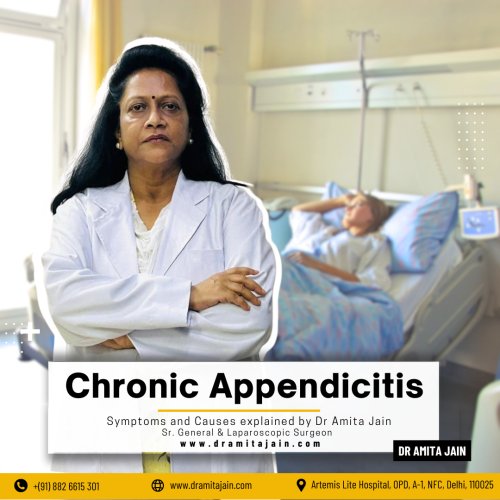Appendicitis is commonly known as a sudden and severe inflammation of the appendix that requires urgent medical care. But not everyone knows that appendicitis can also occur in a chronic form. Chronic appendicitis is much rarer, and because its symptoms are milder and longer-lasting, it often goes undiagnosed for weeks or even months.
Unlike acute appendicitis, which usually causes intense pain and requires immediate surgery, chronic appendicitis develops slowly. While it doesn’t always lead to an emergency, it still requires medical attention to prevent complications, shares Dr Amita Jain, a leading laparoscopic surgeon and one of the top doctors and surgeons for appendicitis treatment in Delhi and India.
What are the Symptoms of Chronic Appendicitis?
Chronic appendicitis symptoms can be confusing because they come and go or feel like other digestive problems. Here are the most common signs:
- Mild to moderate abdominal pain – Pain often starts near the belly button and moves to the lower right side of the abdomen. It may feel dull, aching, or cramp-like. Unlike acute appendicitis, the pain usually isn’t severe but can linger for weeks.
- Digestive discomfort – You may have bloating, gas, or a feeling of fullness after eating. Occasional nausea or mild vomiting can occur.
- Loss of appetite – Many people notice they don’t feel hungry as usual.
- Low-grade fever – Some patients have a slightly elevated body temperature.
- General fatigue – Ongoing pain and digestive issues can make you feel unusually tired.
The symptoms often flare up and subside, which is why chronic appendicitis is frequently mistaken for irritable bowel syndrome, gastritis, or other abdominal conditions.
What are the Causes of Chronic Appendicitis?
Chronic appendicitis happens when the appendix becomes partially obstructed, leading to long-lasting inflammation. Unlike acute appendicitis, the blockage is not complete, so the appendix doesn’t swell as dramatically. Common causes include:
- Partial blockage of the appendix – A small amount of stool, a calcified deposit (appendicolith), or scar tissue can partially block the opening.
- Previous infection or inflammation – An earlier episode of acute appendicitis may leave the appendix inflamed and prone to chronic irritation.
- Lymphoid hyperplasia – Enlargement of lymph tissue in the appendix wall, often due to infections or immune responses.
- Chronic low-grade infection – Persistent bacterial infection can trigger continuous mild inflammation.
However, these causes don’t always create intense pressure or rapid swelling; symptoms tend to be milder and intermittent.
When to See a Doctor for Chronic Appendicitis?
If you have ongoing pain in the lower right abdomen or unexplained digestive symptoms, don’t ignore them. Chronic appendicitis can eventually progress to acute appendicitis, increasing the risk of a rupture, which is a serious medical emergency.
A doctor will typically recommend a physical examination, an ultrasound or CT scan, and blood tests to check for infection or inflammation. Treatment usually involves surgical removal of the appendix (appendectomy) to prevent future complications.
Recognizing the subtle signs of chronic appendicitis is important. If you suspect something is wrong, seek medical advice to get a proper diagnosis and treatment. Early action can help you avoid more serious problems later on.

Dr Amita Jain is one of India’s most distinguished and experienced senior surgeons who has conducted more than 1,00,000 successful surgeries, and has covered a wide spectrum of general and minimally invasive procedures. Dr Amita Jain is refered as the pioneer surgeon in the fields of Gallbladder stone removal surgery, appendix removal surgery, hernia repair surgery, Pilonidal Sinus treatments, varicose vein and piles surgery, fistula surgery and fissure surgeries.
With an outstanding career spanning over 29 years, Dr Amita Jain has earned her place among the top General and Laparoscopic surgeons in Delhi and India, known for her precision, compassion, and consistent surgical excellence. She was the Professor of Surgery at the Army College of Medical Sciences and Base Hospital, Delhi Cantt. In 1994, she was commissioned as a surgeon under the United Nations Mission in Congo.
Dr Amita Jain currently serves as the Head of Department and Senior Consultant for General, Laparoscopic and Trauma Surgery at Artemis Lite Hospital, Rosewalk – Luxury Maternity Hospital in Delhi (Panchsheel Park, Delhi) and Rainbow Children Hospitals (Malviya Nagar, Delhi).

